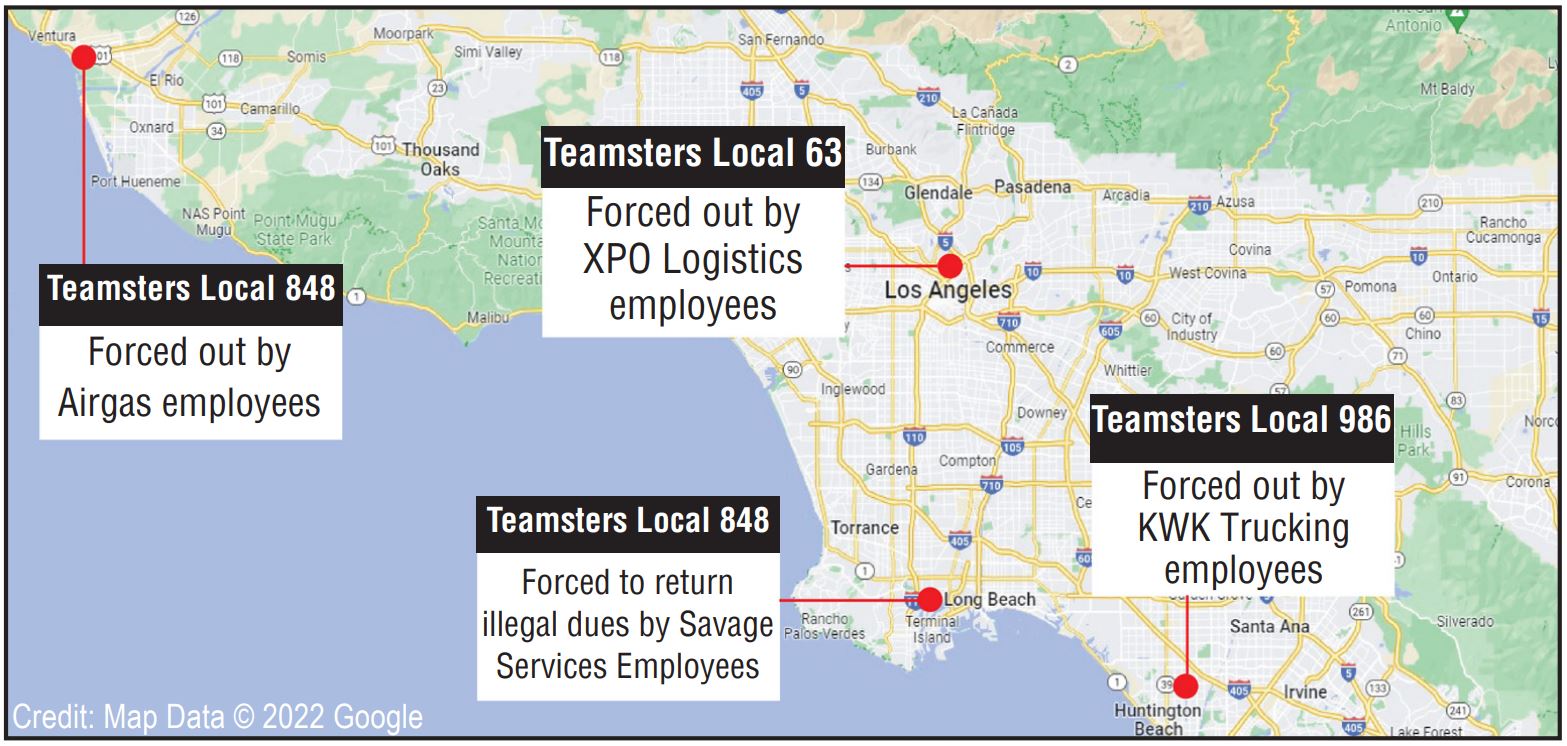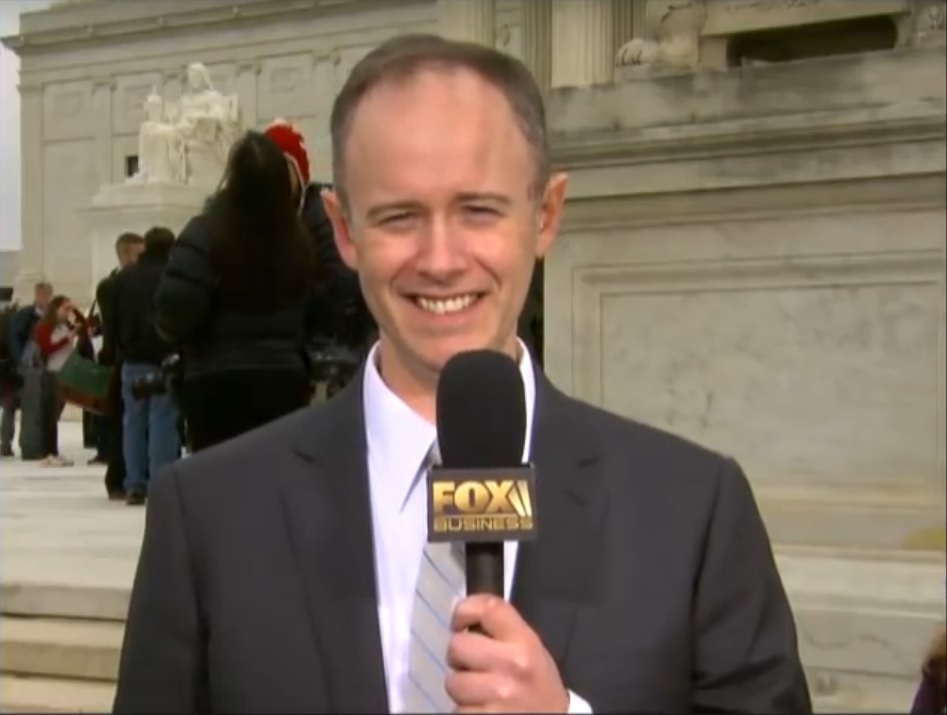Southern IL Aluminum Worker Slams IBEW Union with New Federal Charges After Illegal Termination Threat
IBEW union officials threatened to fire worker for failure to pay union fees, even though union contract is invalid
Murphysboro, IL (August 26, 2022) – Penn Aluminum International employee Mary Beck has filed new federal charges against the International Brotherhood of Electrical Workers (IBEW) Local 702 union, stating that union officials threatened to get her fired for failure to pay union fees demanded under a defective contract.
Beck, who is receiving free legal aid from the National Right to Work Foundation, has amended charges she hit the union with in June. The original charges stated IBEW union officials unlawfully seized money from her wages without her consent and without proving that a contract mandating such deductions is in effect.
Because Illinois lacks Right to Work protections for its private sector employees, union officials can legally force workers in facilities under union control to pay some union fees just to stay employed. However, union bosses lose this legal privilege if there is no valid monopoly bargaining contract in effect. Under longstanding law, union officials must also gain consent from a worker before they can demand that an employer deduct compulsory fees from a worker’s paycheck.
Beck’s original unfair labor practice charge noted that she sent a letter to IBEW union chiefs and her employer in January 2022 exercising her right to resign her union membership and to stop any union dues deductions from her paychecks that are not required to maintain employment. Her letter also demanded a copy of any contract that gives IBEW officials the power to require dues payments as a condition of employment.
When she received no response, she redelivered this letter by hand in March 2022. In this letter Beck also requested that, if IBEW union officials could produce a valid contract, her dues payments be reduced as per the Foundation-won CWA v. Beck Supreme Court decision. In CWA v. Beck the Court ruled that union officials in non-Right to Work states cannot force nonmembers to pay fees for political and other union activities outside the union’s bargaining functions. Union dues were still deducted from her paycheck after this letter.
IBEW Union Bosses Blew Off Worker Requests for Months, Then Threatened Her Termination
Beck’s amended charge states that IBEW union officials didn’t acknowledge her requests until July, when they finally sent a copy of the union contract and ended dues deductions, but still demanded she pay an unspecified amount of union fees to keep her job. The amended charge points out that the contract produced does not contain language that lets IBEW bosses take advantage of their legal privilege to force all employees to pay dues as a condition of employment.
According to the amended charge, the contract also does not “contain the grace period required by Section 8(a)(3)” of the National Labor Relations Act (NLRA). That section of the NLRA requires new employees to be given at least 30 days before being compelled to pay union fees in a workplace under a forced-fees union contract.
Union officials in an August 9 letter threatened to terminate Beck by August 15 if she didn’t pay union fees. “The letter failed to provide Charging Party with the exact amount the Union claims she owes or a reasonable opportunity for her to pay those alleged fees,” Beck’s amended charge says. Both are required by longstanding precedents.
Beck’s new charge argues that the union’s continued deduction of dues after her March letter and demands for union fees without a valid contract in place violate her rights under the NLRA.
“IBEW bosses threatening to upend Ms. Beck’s career for failure to pay fees to which the union’s sloppily-written contract doesn’t even entitle them is terrible malfeasance to be sure, but a correctly written contract certainly wouldn’t solve the problem,” commented National Right to Work Foundation President Mark Mix. “The real injustice is that millions of workers across the country, Ms. Beck included, can be forced to pay anything to a union hierarchy just to keep their jobs.”
“Ultimately, every worker in America deserves the protection of a Right to Work law, not only so workers are shielded from having to choose between their jobs and funding a union they oppose, but also because when dues are fully voluntary union officials must prove their worth to workers before earning their financial support,” Mix added.
Freight Company Worker Wins More Than $10,500 for Being Illegally Fired for Not Joining Teamsters Union
Back pay award ends case against employer, federal charge against union for instigating illegal termination still under NLRB investigation
Jackson, MN (August 25, 2022) – Jannie Potgieter, who was a freight employee at industrial park USF Holland in Jackson, Minnesota, filed federal charges against the International Brotherhood of Teamsters Local 120 union and his employer in May for illegally terminating him for exercising his right not be a union member. Now Mr. Potgieter has received approximately $10,512 in back pay from USF Holland in exchange for dropping the charge against the company. The charge against the union for union officials’ role in the illegal termination is still pending.
Mr. Potgieter’s charges were filed on May 27, 2022, at the National Labor Relations Board (NLRB) Region 18 with free legal representation from National Right to Work Legal Defense Fountain staff attorneys. The charges stated that on May 18, 2022, a USF Holland manager fired Mr. Potgieter because he exercised his rights under the Communications Workers of America v. Beck (1988) U.S. Supreme Court precedent not to join the union.
In the non-NLRB settlement with USF Holland, Mr. Potgieter agreed to withdraw his unfair labor charge in exchange for the back pay plus employer-provided training for management about workers’ Beck rights and a prohibition on firing workers who refuse to join a union. The NLRB Regional Director approved the settlement, but continues to investigate the charge against Teamsters Local 120.
Because Minnesota lacks Right to Work protections for private sector employees, unions can force them to pay union fees as a condition of keeping their jobs. However, under Beck, a U.S. Supreme Court decision won by Foundation staff attorneys, formal union membership cannot be required, nor can payment of the part of dues used for non-bargaining expenditures like union political activities. In contrast, in the 27 states with Right to Work protections, union membership and financial support are strictly voluntary.
“Mr. Potgieter’s illegal firing for exercising his basic rights shows why Minnesota workers need the protection of a Right to Work law to ensure all union membership and financial support is strictly voluntary,” commented National Right to Work Foundation President Mark Mix. “While we’re glad USF Holland has belatedly taken responsibility for its role, union bullies must also be held accountable for instigating this blatantly illegal firing.”
“With Labor Day right around the corner, this case serves as a reminder that being pro-worker must mean rejecting compulsion and allowing each and every working American the freedom to decide for themselves whether or not to spend their hard-earned paycheck on union dues,” added Mix.
National Employee Freedom Week: Time to Build on Janus by Ending Injustice of Forced Union Monopoly ‘Representation’
Foundation’s 2018 Supreme Court victory protects public workers’ right not to fund union they oppose, but union officials can still ‘speak for’ dissident workers
Washington, DC (August 19, 2022) – National Right to Work Foundation President Mark Mix issued the following statement in recognition of National Employee Freedom Week:
“On this week, we remind all independent-minded American educators and public sector workers that the First Amendment forbids union officials from getting employees fired merely for refusal to join or fund a union that pushes divisive politics, negotiates lousy contracts, or simply acts against worker interests.
“However, while the Foundation’s 2018 Supreme Court victory in Janus v. AFSCME protects public workers’ ability to stop subsidizing union activities they oppose, much more needs to be done to fully defend these employees’ free association rights. Public sector union officials in the vast majority of states still wield government-granted monopoly ‘representation’ power over workers who don’t want and never asked for a union, and the Foundation is currently fighting alongside workers who oppose their voices being stifled by this coercive, unconstitutional privilege.”
National Employee Freedom Week is dedicated to educating American public teachers and other public sector employees that they have a right to refuse to fund or join unions in their workplace that do not serve their interests. Public employees are also advised this week that, although union bosses don’t want them to know it, many non-union voluntary options exist to provide liability insurance and other benefits that union officials tout as a reason to join a union, even though union membership means paying for union political activities that many workers oppose. In fact, many non-union options for liability insurance, especially for teachers, provide better coverage than union options at far less cost to teachers.
In the 2018 Janus v. AFSCME Supreme Court decision argued and won by Foundation staff attorneys, the Justices ruled that public employees have a First Amendment right to cut off dues to an unwanted union, and also recognized that union dues could only be deducted from a public sector employee’s paycheck with their explicit consent. Even today, many union officials refuse to abide by this limit on their coercive power, resulting in numerous ongoing lawsuits by Foundation staff attorneys seeking to enforce workers’ Janus rights.
In the Janus decision, Justice Samuel Alito, who wrote for the majority, additionally explained that union monopoly “representation” power in the public sector is “a significant impingement on associational freedoms that would not be tolerated in other contexts,” perhaps indicating an interest from the High Court in striking down this coercive privilege in the future.
NLRB Certifies Mankato Mayo Clinic Nurses’ Vote to Oust MNA Union Officials, Rejects Union Boss Attempt to Overturn Vote
Nurses now free of both unwanted union monopoly ‘representation’ and forced union fee demands
Mankato, MN (August 18, 2022) – Mayo Clinic nurses’ vote to oust unwanted Minnesota Nurses Association (MNA) union officials from their workplace has been certified by the National Labor Relations Board (NLRB), in a decision that also rejected two union objections to the election. The nurses voted 213-181 in July to remove the MNA as their monopoly “representative.” Union officials attempted to not only overturn the result, but to prohibit the workers from even holding another decertificiation vote.
Nurse Brittany Burgess filed a petition in June with Region 18 of the NLRB for more than 200 of her coworkers requesting the election. She did so with free legal aid from National Right to Work Foundation staff attorneys.
Minnesota is not a Right to Work state, meaning Burgess and the nurses voting in the election at Mayo Clinic had been forced to pay fees to MNA union bosses they opposed just to keep their jobs. Now that the NLRB has certified the “decertification election” results, the nurses are free of both union officials’ forced-fee demands and the union’s control over their terms and conditions of employment.
NLRB Ruling Rejects Union Boss Objections to Election Entirely
NLRB Region 18’s decision and order certifying the vote rejected both arguments from MNA union officials that the vote should be overturned. Union officials claimed a sample ballot circulated by workers opposed to the union didn’t contain legally-required disclaimers about the neutrality of the NLRB. The officials also made vague allegations that other conduct somehow improperly swayed the employees’ choice.
The NLRB election certification order explains that a reviewed photo of the sample ballot “clearly contains the disclaimer language.” The order also declares that the union’s objection to other conduct is not only too “nonspecific” to be meet the NLRB’s standards, but further states that the conduct it alludes to would not rise to the level of invalidating an employee vote anyway.
Though MNA union officials’ attempt to upend the Mayo Clinic vote was particularly vacuous, Burgess and her coworkers were guarded from even more arbitrary union delays thanks to Foundation-advocated reforms to union decertification rules adopted by the NLRB in 2020. Before the reforms, union officials could file “blocking charges” to stop a vote to oust a union from even commencing. Such charges often contained allegations of employer conduct that were both unproven and unrelated to the employees’ desire to get rid of the union.
Unfortunately, the Biden NLRB announced in June it was initiating rulemaking to overturn those reforms and make it easier for union officials to block decertification votes, no matter how many rank-and-file workers request a vote.
Foundation Assisting Nurses at Other MN Medical Facilities to Exercise Right to Vote Out Unions
National Right to Work Foundation staff attorneys have recently assisted other workers in numerous successful decertification efforts. Just this month, Foundation-backed workers at Mayo Clinic’s location in St. James, MN, removed American Federation of State, County and Municipal Employees (AFSCME) Council 65 from their hospital.
Foundation staff attorneys are also assisting nurses at four Cuyuna Regional Medical Center locations with obtaining a vote to remove Service Employees International Union (SEIU) bosses from their facilities. Because the NLRB has made the decertification process unnecessarily complicated, workers often need to turn to Foundation attorneys for free legal aid in navigating the process.
“These nurses worked hard to exercise their right to remove a union they didn’t feel represented their interests, and Foundation staff attorneys were happy to help them,” commented National Right to Work Foundation President Mark Mix. “MNA union officials’ arbitrary attempt to block the certification of the nurses’ will demonstrates the ridiculous charades union officials often pull just to keep siphoning money from workers who don’t want them anymore.”
“The situation also puts into stark relief the risk the Biden NLRB is putting independent-minded workers in by attempting to reverse the recent Election Protection reforms. Eliminating the reforms will make it easier for union bosses to trap workers in forced-dues union ranks, even when a majority of workers oppose the union’s so-called ‘representation,’” Mix added.
King Soopers Workers Successfully Challenge Illegal UFCW Union Strike Fines with National Right to Work Legal Aid
UFCW union bosses begin dropping illegal fines against workers, but union still faces investigation on federal charges
Denver, CO (August 15, 2022) – Grocery store workers at King Soopers are continuing to battle, and win, against the United Food and Commercial Workers (UFCW) Local 7 union officials’ illegal attempts to fine workers for exercising their right to work during a January UFCW strike action. While the union remains under investigation by the National Labor Relations Board (NLRB) for a series of charges filed by workers with free legal aid from the National Right to Work Legal Defense Foundation, several workers have already successfully challenged thousands of dollars in union fines.
In June and July three King Soopers workers, Nick Hall, Marcelo Ruybal and Hope Schaefer, filed federal charges against UFCW in response to union officials illegally threatening to fine the workers, who chose to exercise their right to work during a strike. The workers, whom union bosses are threatening to fine $812, $3,800, and $3,897.36 respectively, stated in their charges that the fines were illegal because the workers were not voluntary union members, and therefore not legally subject to internal union fines for working during the UFCW boss-ordered 10-day strike.
All three NLRB charges are still being investigated by NLRB Region 27 based in Denver.
In Schaefer’s case the union had previously even acknowledged in a 2011 letter that she was not a UFCW union member. However, although the union know she had not been a union member for more than a decade, UFCW union officials still threatened her with the nearly $4,000 fine.
In Hall’s case, the union recently backed down, rescinding the union’s illegal fine threat in a letter dated July 27, essentially acknowledging that it broke federal law. Other workers have also successfully challenged union boss fine threats following the January strike. With free legal representation from Foundation staff attorneys, worker Yen Chan challenged the union’s authority to issue a $3,552.48 fine, with union officials backing down rather than face further legal action.
At least two other King Soopers workers also successfully challenged thousands of dollars in UFCW strike fines using information provided by National Right to Work Legal Defense Foundation staff attorneys. Any worker facing such fines can still request free legal aid from the National Right to Work Foundation by calling 1-800-336-3600 or through the Foundation’s website: www.nrtw.org/free-legal-aid
“King Soopers workers are already beating back illegal fines levied by UFCW union officials, even as union officials are still under investigation by the NLRB for three unfair labor practice charges,” commented National Right to Work Foundation President Mark Mix. “Union bosses were caught red-handed in Nick Hall’s case which is why we’re already seeing them back down, but it shouldn’t take the assistance of National Right to Work Foundation staff attorneys just to force union bullies to abide by federal law and cease violating the rights of rank-and-file workers.”










